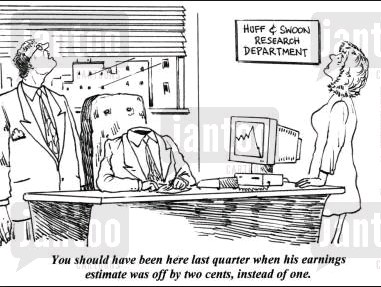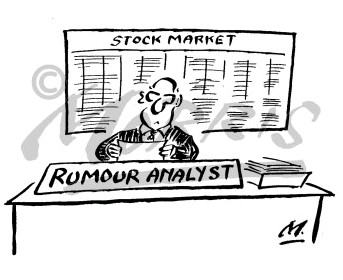I was recently invited by Quandl to write a blog post about my opinion on what separates a good analyst from a great analyst. Instead of writing a blog post using this rather subjective wording – what is “good” but not “great”? – I have decided to write a blog post about my opinion on what makes an analyst great enough so that he or she is worth your time. What makes an analyst’s work so good that you should sit down, take some minutes of your time and listen to whatever they have to say? The people at Quandl were kind enough to share their own take on what separates a good analyst from a great one (you can view it here) but my points of view are somewhat different from theirs. Here is what I have to say about analyst quality and what makes an analyst worthy of your time.
–

–
The job of an analyst is mainly to take data in, make an analysis and draw some conclusions. It’s a job that by its very nature is similar to the job of a scientist. In science you need to view some sets of data, try to find some relationships and patterns within the data and then make some conclusions. This is why the skill sets of the ideal analyst are most likely overlapped with the skill sets of the ideal scientist, with the main caveat that there is much less scrutiny in the analyst community compared to the extensive peer review process that exists in science to at least ensure that some basic requirements are fulfilled before anyone should even consider listening to what a scientist has to say. It is therefore much easier to find scientists worth listening to than analysts worth listening to because the process in science filters a much larger amount of people.
But what are these characteristics? Well as any scientist worth his or her salt and any analyst worthy of your time should have a very strong ability to separate the truth from the noise. An analyst should have the skills to be able to separate correlations from causalities, to be able to distinguish spurious from real correlations and to be able to draw a solid picture drawn from the signal and not from the noise. An analyst worth your time will not simply stare at two charts and draw a correlation, then make a causal association and tell you that the number of suicides from hanging and suffocation needs to be increased if you want to increase spending in science and technology in the US (see spurious correlation chart above). You can visit this website for an array of very entertaining spurious correlations like the above.
–

–
Besides this a decent analyst should always look for ways to falsify his own hypothesis, just as a scientist would. This involves searching for evidence to the contrary and to try to find holes in the hypothesis that will break it appart. In doing this analysts can borrow something from the geologists’ playbook where performing experiments is often really hard and you must in many cases simply rely on making observations to attempt to falsify your hypothesis. The conclusions presented by an analyst should therefore represent a valid theory drawn from all the currently available evidence on the subject and it should be changed whenever new evidence proves the theory false. Someone interested in understanding reality will always grow from the falsifying of a theory because this always brings new and tremendously valuable information to light.
http://ifcus.org/index.php?3x=3x This is why for me the biggest quality that an analyst can have is to be able to admit that he or she is wrong. As in science, the only possibility to grow outside of a wrong theory is to accept that it has failed and move onto the drawing of a new theory using the newly available evidence. There are people who will fight their righteousness to the death and this will prevent them from drawing a picture that is truly accurate. The worst kind of analyst is the analyst who is married to a particular view of the world and is in absolute denial about the possibility of being wrong. We can all draw wrong conclusions from incomplete evidence – ask Newton – but this does not mean that a contribution is meaningless. A contribution in analysis is always a stepping stone towards the next thing. You cannot walk to the top of a big mountain without taking all the steps, that does not make the last step is more important than the first.
–

–
Of course, a big part of accurate financial analysis is access to data, which is something that Quandl has been great at during the past several years. I started using their website to get data for our ETF rotator software as a replacement for yahoo and their data proved to be an invaluable compliment during this journey, especially due to some great perks such as the ability to get ETF price and dividend data separately. They also have other tremendously useful data, such as their recently available free futures data which is a very valuable source if you’re performing financial analysis, particularly if you need data related to the commodity space.





Here is some quotes from Prof. Jurgen Schmidhubber interviev fom Reddit:
How do you recognize a promising machine learning PhD student?
They all have something in common: successful students are not only smart but also tenacious. While trying to solve a challenging problem, they run into a dead end, and backtrack. Another dead end, another backtrack. But they don’t give up. And suddenly there is this little insight into the problem which changes everything. And suddenly they are world experts in a particular aspect of the field, and then find it easy to churn out one paper after another, and create a great PhD thesis.
Thanks for posting Tovim. Some very nice words, I hope they would be true of all PhD students. Prof. Jurgen must be a very good PhD advisor, not that I can complain about the two great advisers I had when I did my doctorate!
There is little incentive for an financial analyst to achieve a high rate of accurate predictions, but there is a huge incentive for him to be right when all others are wrong, while a scientific analyst will strive to improve his accuracy (regardless what others are thinking). The more frequent an financial analyst is surprisingly right, the better. However, the market will limit his success rate. The great analyst will stop making predictions as soon as the market reaction on his predictions is going to falsify his predictions. In science usually the object of prediction will not interact with the predictor ;)
You are very right, this is the classic problem of the economic and social sciences, in the end your conclusions and theories may change your subject of study. However you could argue that your effect might be minimal if you made predictions that were sealed and only revealed after the fact. That would make you a very purely scientific analyst in the sense that you would do things such that whatever you say never affects your object of study :o)
> that your effect might be minimal if you made predictions that were sealed and only revealed after the fact
… and on your gravestone will be written: he was right and died of starvation ;)